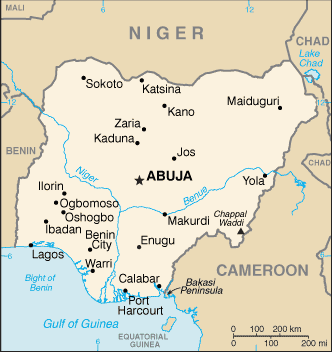Sep 12 2012
Topics Covered
Welcome to Nigeria
Overview of Resources
Industrial Minerals
Metals
Fossil Fuels
Investment
Sources
Welcome to Nigeria
Nigeria, with a total population of 170,123,740 as of July 2012, is located in Western Africa, bordering the Gulf of Guinea, between Benin and Cameroon. The country has an arid climate in the north, equatorial climate in the south and tropical climate in the central region and it covers a total area of 923,768 km2.
 |
The national flag of Nigeria.
Image Credit: CIA Factbook. |
After over 16 years of military rule, Nigeria gained independence in 1960 and a new constitution was formed in 1999. Following this, the country experienced a peaceful and complete transition to a civilian government. In 2008, Nigeria had to undergo many economic reforms as the country was severely shaken up by poor macroeconomic management, political instability, inadequate infrastructure and corruption. The government modernized the country’s banking system and settled disputes related to distribution of profits from the country’s oil industry.
As a result of these initiatives, the country’s GDP increased steadily, especially due to the increase in global crude oil prices and improvement in the non-oil sectors. Nigeria’s GDP as of 2011 was $418.7 billion.
Overview of Resources
Nigeria’s key natural resources include oil, natural gas, coal, lead, tin, limestone, iron ore, niobium and zinc.
Nigeria is rich in oil and in 2010 the country accounted for about 2.9% of the world oil production and 24% of African oil production. An increase of 15% was seen in the crude oil output from the Nigerian National Petroleum Corp in the same year.
Nigeria has vast mineral resources. Experts highlight that the country has good quality zinc and lead and significant deposits of tantalite that are regarded as world class.
Industrial Minerals
In 2010, the Nigerian government planned to update the country’s policy on imported bulk cement. As part of this policy the government planned to carry out a review process each year to analyze the country’s need for imported cement. Cancellation of unused cement licenses and placing a 20% duty on imported bulk cement was also part of this policy.
In 2010, Dangote Cement, a division of Dangote Industries Ltd. of Nigeria, planned to develop a partnership with Benue Cement Company Plc of Nigeria. Dangote Industries had a 75% equity interest in Benue Cement Company.

The map of Nigeria. Image Credit: CIA Factbook
Metals
The Aluminum Smelter Co. of Nigeria, which is a two-potline plant, was expected to have a capacity of 193,000 Mt/yr by 2010. This was not achieved due to the global recession in 2008 and 2009. However, in 2010 an increase in output to about 21,200 Mt from about 13,000 t in 2009 was achieved by one potline.
Nigeria, according to experts, has a number of high grade gold mines. There is a possibility to re-open the previously explored mines in Nigeria and also to resume work on low grade mines that will indeed increase the country’s mining potential. Foreign investors are keen to explore the Nigerian gold mines because of the increasing gold prices in the international market.
Fossil Fuels
Nigeria is globally known for its oil reserves and the country’s economy entirely depends on its oil industry. In 2010, Shell Petroleum Development Company of Nigeria Ltd carried out production of natural gas and crude oil from the Gbaran-Ubie project. Natural gas is distributed to Nigeria Liquefied Natural Gas Co. facilities and power plants.
In 2010, Shell Nigeria Exploration and Production Co and the Shell Petroleum Development Company of Nigeria Ltd. accounted for about 26% of the crude oil production in Nigeria. Companies associated with ExxonMobil accounted for about 25% of crude oil production in Nigeria.
Nigeria is keen on developing its coal mining industry as studies highlight that the country has proven deposits of over 1.5 billion t based only on partial exploration. Development in coal mining will thus result in a simultaneous development in the country’s power infrastructure.
Investment
The Nigerian government has expressed its political will to introduce market friendly policies that include privatization of government-owned mining assets and companies. With privatization as the main aim, the country hopes to attract both foreign and domestic investors to explore and exploit economic mineral deposits.
Though Nigeria plans to develop its coal mining sector and foreign investors appear interested in this. However, according to experts, this international attraction that Nigeria is trying to draw may not have a positive outcome because the country still faces civil unrest and power shortages.
Experts say that development in Nigeria’s mining industry will take place only with adequate power and the government has come up with an energy plan that ensures to cater to the needs of the power sector and simultaneously improve the country’s mining industry. Nigeria’s rich mineral wealth will also create a positive impact on the country’s economic growth rate.
Nigeria’s future thus seems to be bright in its mineral mining and oil sectors, thanks to the government’s efforts to develop the country’s infrastructure and attract more foreign investments.
Disclaimer: The Author of this article does not imply any investment recommendation and some content is speculative in nature. The Author is not affiliated in any way with any companies mentioned and all statistical information is publically available.
Sources